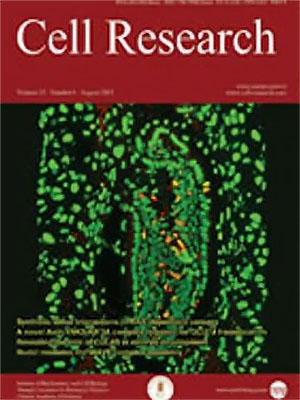
Volume 14, No 4, Aug 2004
ISSN: 1001-0602
EISSN: 1748-7838 2018
impact factor 17.848*
(Clarivate Analytics, 2019)
Volume 14 Issue 4, August 2004: 295-302
ORIGINAL ARTICLES
The modulation of radiation-induced cell death by genistein in K562 cells: Activation of thymidine kinase 1
Min Ho JEONG1, Young Hee JIN1, Eun Young KANG1, Wol Soon JO1, Hwan Tae PARK1, Jae Dong LEE2, Yeo Jin YOO1, Soo Jin JEONG1,3,
1Research Supporting Center for Medical Science (BK21 program), Dong-A University College of Medicine, Busan, Korea.
2Department of Microbiology, Pusan National University, Busan, Korea.
3Virus Tumor Biology Section, Laboratory of Cellular Oncology, Center for Cancer Research, National Cancer Institutes, National Institute of Health, Bethesda, MD 20892, USA.
Correspondence: Soo Jin JEONG(jeongs@mail.nih.gov)
Ionizing radiation is one of the most effective tools in cancer therapy. In a previous study, we reported that protein tyrosine kinase (PTK) inhibitors modulate the radiation responses in the human chronic myelogenous leukemia (CML) cell line K562. The receptor tyrosine kinase inhibitor, genistein, delayed radiation-induced cell death, while non-recepter tyrosine kinase inhibitor, herbimycin A (HMA) enhances radiation-induced apoptosis. In this study, we focused on the modulation of radiation-induced cell death by genistein and performed PCR-select suppression subtractive hybridization (SSH) to understand its molecular mechanism. We identified human thymidine kinase 1 (TK1), which is cell cycle regulatory gene and confirmed expression of TK1 mRNA by Northern blot analysis. Expression of TK1 mRNA and TK 1 enzymatic activity were parallel in their increase and decrease. TK1 is involved in G1-S phase transition of cell cycle progression. In cell cycle analysis, we showed that radiation induced G2 arrest in K562 cells but it was not able to sustain. However, the addition of genistein to irradiated cells sustained a prolonged G2 arrest up to 120 h. In addition, the expression of cell cycle-related proteins, cyclin A and cyclin B1, provided the evidences of G1/S progression and G2-arrest, and their relationship with TK1 in cells treated with radiation and genistein. These results suggest that the activation of TK1 may be critical to modulate the radiation-induced cell death and cell cycle progression in irradiated K562 cells.
FULL TEXT | PDF
Browse 2030


